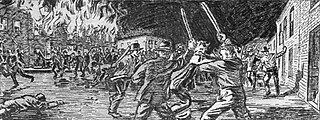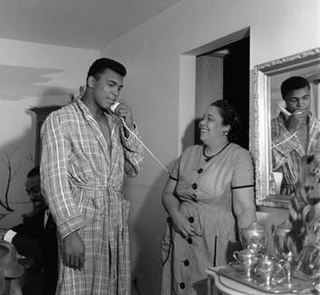
Kentucky, officially the Commonwealth of Kentucky, is a state in the Southeastern region of the United States and one of the states of the Upper South. It borders Illinois, Indiana, and Ohio to the north, West Virginia to the northeast, Virginia to the east, Tennessee to the south, and Missouri to the west. Its northern border is defined by the Ohio River. Its capital is Frankfort, and its two largest cities are Louisville and Lexington. Its population was approximately 4.5 million in 2020.

Knott County is a county located in the U.S. state of Kentucky. As of the 2020 census, the population was 14,251. Its county seat is Hindman. The county was formed in 1884 and is named for James Proctor Knott, Governor of Kentucky (1883–1887). It is a prohibition or dry county. Its county seat is home to the Hindman Settlement School, founded as America's first settlement school. The Knott County town of Pippa Passes is home to Alice Lloyd College.

Joseph Frank Pesci is an American actor and musician. He is known for portraying tough, volatile characters in a variety of genres and for his collaborations with Robert De Niro and Martin Scorsese in the films Raging Bull (1980), Goodfellas (1990), Casino (1995), and The Irishman (2019). He also appeared in Once Upon a Time in America (1984), Moonwalker (1988), JFK (1991), A Bronx Tale (1993), and The Good Shepherd (2006). His comedy roles include such films as the first two installments in the Home Alone franchise (1990–1992), My Cousin Vinny (1992), and the Lethal Weapon franchise (1989–1998).
The United Irishman was an Irish nationalist newspaper co-founded by Arthur Griffith and William Rooney. It was first published on the 4th of March 1899 and ran from 1899 to 1906. Contributors included Oliver St. John Gogarty, Pádraig Pearse, Maud Gonne and Roger Casement. The writer James Joyce is quoted as saying that the United Irishman was "the only newspaper of pretensions in Ireland". In 1906 the United Irishman collapsed under a libel suit and was refounded as Sinn Féin, which ran until 1914 when it was suppressed by the British government.

Hindoo (1878–1901) was an outstanding American Thoroughbred race horse who won 30 of his 35 starts, including the Kentucky Derby, the Travers Stakes, and the Clark Handicap. He later sired Preakness Stakes winner Buddhist and Belmont Stakes winner and Leading sire in North America Hanover.

The Flying Irishman is a 1939 biographical drama film produced by RKO Pictures about Douglas Corrigan's unofficial transatlantic flight the previous year in a dilapidated Curtiss Robin light aircraft. The film was directed by Leigh Jason based on a screenplay by Ernest Pagano and Dalton Trumbo.
"The Form of the Sword" is a short story by Argentinian author Jorge Luis Borges, first published in July 1942 in La Nación, and included in the 1944 collection Ficciones, part two (Artifices). The first English translation appeared in New World Writing No. 4, in 1953. In the story, an Irishman, now living near Tacuarembó in Uruguay, recounts his experiences in the Irish War of Independence and how he received the large scar on his face.

Francis Joseph Sheeran, also known as "The Irishman", was an American labor union official and enforcer for Jimmy Hoffa and Russell Bufalino. He was accused of having links to the Pittston crime family in his capacity as a high-ranking official in the International Brotherhood of Teamsters (IBT), the president of Local 326.

Bloody Monday was a series of riots on August 6, 1855, in Louisville, Kentucky, an election day, when Protestant mobs attacked Irish and German Catholic neighborhoods. These riots grew out of the bitter rivalry between the Democrats and the Nativist Know-Nothing Party. Multiple street fights raged, leaving twenty-two people dead, scores injured, and much property destroyed by fire. Five people were later indicted, but none were convicted, and the victims were not compensated.
Jarlath Regan is a London-based Irish comedian and podcaster. A former graphic design consultant, he began his stand-up comedy career in 2003 and by the end of 2004 was a finalist for three major UK comedy newcomer awards: So You Think You're Funny, BBC New Comedy Awards and the Chortle Student Comedian of the Year. While attending University College Dublin, he was auditor of the Literary and Historical Society.

Odessa Lee Clay was the mother of three-time world heavyweight champion Muhammad Ali and Rahman Ali, and the paternal grandmother of Laila Ali. She married Cassius Marcellus Clay Sr. in the 1930s and worked for some time as a household domestic to help support her young children. She supported and inspired her son throughout his boxing career and was a ring-side regular at his bouts.

Hamburg (1895–1915) was an American Thoroughbred race horse. The leading American colt of his generation, Hamburg was retrospectively named the American Horse of the Year for 1898. After his racing career he went on to be a successful sire.
Events from the year 1763 in Ireland.
The history of the Irish in Louisville, Kentucky, USA dates to the founding of the city. There were two major waves of Irish influence on Louisville - the Scots-Irish in the late 18th century, and those who escaped from the Great Famine of the 1840s.

Kill the Irishman is a 2011 American biographical crime film directed by Jonathan Hensleigh, and starring Ray Stevenson, Vincent D'Onofrio, Christopher Walken, and Val Kilmer. Written by Hensleigh and Jeremy Walters, it is based on the life of the Irish-American gangster Danny Greene, and was adapted from the book To Kill the Irishman: The War That Crippled the Mafia by Rick Porrello.
Virgil (1864–1886) was an American thoroughbred racehorse that was bred in Kentucky by Hyman C. Gratz. He was a brown to dark bay stallion, was approximately 16 hands high and had a prominent white star on his forehead.[2] His sire, Vandal, was the second leading sire of the time, behind the great Lexington. Virgil was a direct descendant of the thoroughbred foundation sire Herod and was the leading sire in the United States in 1885.

The Irishman is a 2019 American epic gangster film directed and produced by Martin Scorsese and written by Steven Zaillian, based on the 2004 nonfiction book I Heard You Paint Houses by Charles Brandt. It stars Robert De Niro, Al Pacino, and Joe Pesci, with Ray Romano, Bobby Cannavale, Anna Paquin, Stephen Graham, Stephanie Kurtzuba, Jesse Plemons, and Harvey Keitel in supporting roles. The film follows Frank Sheeran, a truck driver who becomes a hitman involved with mobster Russell Bufalino (Pesci) and his crime family, including his time working for the powerful Teamster Jimmy Hoffa (Pacino).

The United Irishman was a nationalist weekly newspaper published by John Mitchel in Dublin in 1848. It was suppressed by the British Government the same year.
The United Irishman/An tÉireannach Aontaithe, first published in May 1948, under Michael Traynor, was the official monthly organ of Sinn Féin sold by its members. After the split in the Irish Republican Movement, the title continued as the organ of Official Sinn Féin, being published from the offices in 30 Gardner Place in Dublin, with the Provisional wing publishing An Phoblacht. The first editor was Seán G. O'Kelly based in an office in 38 South King Street in Dublin. The historian Éamonn MacThomáis edited the paper for a short while prior to the 1970 split in Sinn Féin. Other editors of the paper included Seán Cronin, Seán Ó Brádaigh (1958–1960), Ruairí Ó Brádaigh, Eoin Ó Murchú, Jackie Ward, Seamus Ó Tuathail, Denis Foley and Tony Meade (1967). Contributors to the paper included Eamon McCann, Roy Johnston, Eamon Smullen, Eoghan Harris and Sean Garland. The United Irishman was replaced with The Irish People and the Workers' Weekly in 1980.
The 91st National Board of Review Awards, honoring the best in film for 2019, were announced on December 3, 2019.














